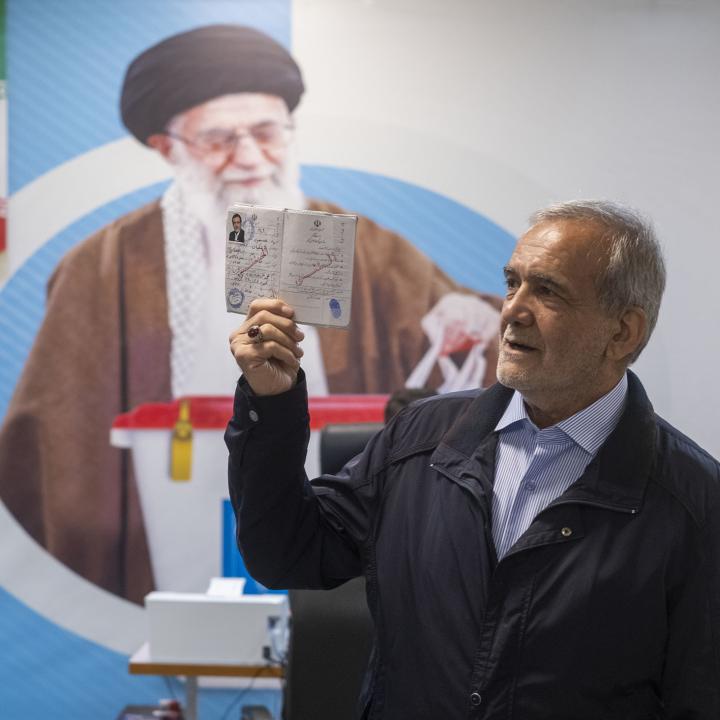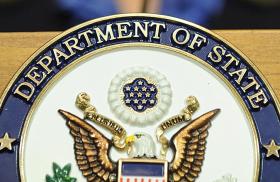
- Policy Analysis
- PolicyWatch 3896
Talking Nicely with Pezeshkian While Postponing Major Steps

Iran’s new reformist president will need time to generate consensus at home before making any significant foreign policy moves; Washington should do the same.
Masoud Pezeshkian takes office as Iran’s president on August 5, just three months before the U.S. presidential election. In a bitterly fought campaign season, policymakers in Washington will be hard-pressed to devote much attention to Iran. Barring further regional escalation, however, there is no rush. Pezeshkian will likely need a few months to get his government organized and will not be in a good position to propose major foreign policy changes before then—if at all. U.S. officials should temper their approach accordingly.
Domestic Iranian Hurdles
If Pezeshkian’s government is slow to pursue policy changes, the regime’s deep political divisions will be the likeliest culprit. Hardline officials who oppose his avowedly reformist agenda hold many important regime posts from which they can slow—if not totally block—substantive action.
Historically, major Iranian foreign policy initiatives do not see the light of day until they are extensively debated in the constitutionally mandated Supreme National Security Council (SNSC), many of whose members are aligned against Pezeshkian:
- His presidential runoff opponent Saeed Jalili
- Speaker of Parliament Muhammad Qalibaf
- Chief Justice Qolam-Hossein Mosheni-Ejei
- Ahmad Jannati, secretary of the Guardian Council
- The four generals who head the Islamic Revolutionary Guard Corps (IRGC), the Armed Forces General Staff, the Artesh, and the Law Enforcement Command
- Three key cabinet members—the ministers of defense, intelligence, and interior—who are traditionally hand-picked by Supreme Leader Ali Khamenei before being formally nominated and appointed by the president and parliament
- IRGC Navy admiral Ali Akbar Ahmadian, the council’s Khamenei-appointed secretary who has no known political experience
Typically, Khamenei does not approve foreign policy initiatives unless they have been given a thumbs-up by the SNSC, a body heavily influenced by his dictates and appointment decisions. Hence, even if Pezeshkian is inclined to push for a major initiative, he would presumably need time to get SNSC approval before going to Khamenei. In the end, neither the council nor the Supreme Leader may be willing to support much change in Iranian policy—Khamenei has already reportedly “advised” Pezeshkian to follow in the footsteps of deceased president Ebrahim Raisi.
That said, Pezeshkian heavily emphasized the need to reinvigorate diplomacy during last month’s brief campaign cycle, describing it as the key to solving Iran’s main problem: economic deterioration. He can therefore be expected to pursue various initiatives that present the country in a new light. Some members of his team, such as former foreign minister Mohammad Javad Zarif, are skilled at making Iran’s case in the international media. Presumably, they will soon be lobbying for the United States and other Western governments to offer substantial concessions in response to the new mood in Tehran.
U.S. Options and Risks
One way to answer this Iranian public relations offensive is by openly and vigorously expressing how much the United States looks forward to working with the new government—but in general, noncommittal terms that do not specify what Washington is willing to do. For example, while U.S. officials can raise the prospect of direct negotiations with Iran on the nuclear issue (or at least indirect negotiations brokered by Oman), they do not need to spell out what they would offer in such talks—similar to how Pezeshkian told voters on the campaign trail that it would be inappropriate for him to detail what Iran is prepared to offer before negotiations begin.
Once the U.S. election cycle is over and Pezeshkian’s team is organized, Washington can take the initiative to address specific problems that hold potential for progress:
- Limited nuclear steps. Although the odds are still stacked against a major breakthrough, the parties may be able to agree on smaller moves—for instance, giving inspectors from the International Atomic Energy Agency more access to nuclear sites and reducing Iran’s production of high-enriched uranium. In return, Washington could offer continued inaction on Iranian oil sales to China, while European officials could pledge to let the sanctions “snapback” provision expire unused in October 2025.
- Financial delisting. Washington could ask the International Monetary Fund or similar authorities to work with Pezeshkian’s government on his oft-stated goal of getting Iran off the blacklist maintained by the Financial Action Task Force (FATF), a status that has exacerbated the country’s problems with accessing international banking networks and attracting foreign investment. This would require Tehran to take formal steps against money laundering and terrorism financing—though Washington should be clear-eyed about the fact that regime actors would find ways to keep funneling money to key regional proxies Hezbollah and Hamas no matter what arrangement is reached.
- Proxy attacks. Both sides would benefit from clearer red lines about which Iranian proxy actions—whether emanating from Iraq, Syria, or Yemen—will draw U.S. military retaliation. Notably, however, drawing such lines could give Tehran license to engage in every provocation it can just short of those limits.
Both sides would be on very shaky ground if they attempt anything more than limited measures. Pezeshkian cannot do much (if anything) to advance the Biden administration’s top Middle East goal: leveraging a ceasefire or other pause in the Gaza war into a megadeal with Saudi Arabia and Israel. Chasing after a potentially illusory breakthrough with Iran will not lead to Israeli-Saudi normalization. Furthermore, Pezeshkian has little incentive to help Washington cement another of its top priorities: avoiding a major war between Hezbollah and Israel. No Iranian political faction wants such a war, so he would reap no benefits at home by pursuing talks or making concessions on the matter.
Washington likewise has serious constraints and reservations about making any bigger offers. Recent years have seen deeper U.S. partisanship on Iran policy, with one party taking steps that are bitterly denounced by the other party and in some cases reversed when offices change hands. The most obvious case is the nuclear file, but the pattern has also affected instances in which Washington agreed to release Iranian prisoners or ease Tehran’s access to blocked funds in exchange for the release of American hostages. Republicans sharply criticized President Biden for one such deal, even though President Trump had struck a similar arrangement. The simple reality is that no U.S. president will want to look soft or naive on Iran, regardless of who is elected in November.
Accordingly, U.S. officials on both sides of the aisle should prioritize proposals that can command broad support at home rather than focusing exclusively on what it would take to sway Iran. Convincing Tehran that future U.S. administrations will honor near-term agreements is important for building the trust needed to advance bigger deals. Ideally, Democratic and Republican leaders or even Congress writ large will agree to publicly support whatever deals are offered to Pezeshkian’s government, though passing actual legislation on such matters would likely require too much effort.
In the years since the 2015 nuclear agreement collapsed, Iranian politicians have repeatedly expressed skepticism about whether to trust U.S. promises made in the context of a deal. A Majlis Research Center study proposed a series of tests about whether Washington would follow through on its pledges, and some of these ideas were then incorporated into a new law restricting the government’s ability to negotiate with the United States—though as in other countries, the law has escape clauses that allow the executive branch to pursue deals deemed to be in the national interest.
In the current climate, a bold policy initiative with Iran would most likely draw intense U.S. partisan criticism and risk derailment during the implementation phase, whether due to congressional opposition or a potential Trump victory in November. This outcome would not serve U.S. interests—not with Iran, and not with U.S. allies. Washington would be better served by expressing interest in renewing initiatives that Tehran and other actors believe will actually be implemented no matter who wins in November. After the election, U.S. officials can open secret negotiations and offer modest proposals that benefit each side. In short, kicking the can down the road may be the wisest policy—as long as Washington kicks loudly.
Patrick Clawson is the Morningstar Senior Fellow at The Washington Institute and director of its Viterbi Program on Iran and U.S. Policy.



